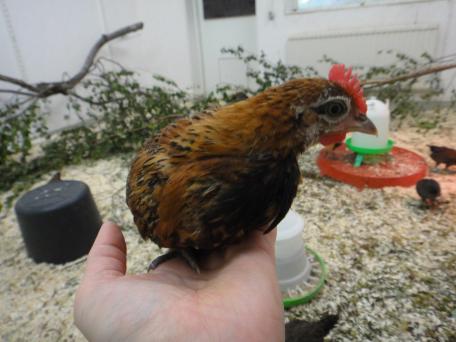Study Subject

Personality research in avian species has only been done on great tits, Parus major. However, great tits are hard to breed and the young are altricial. Fowl (Galloanserae), on the other hand, are easily habituated to humans, chicks are precocial and much is known already about their behaviours and physiology.
In this study, the red junglefowl, the main ancestor to the domesticated chicken, is used. Individual fowl go through several different life stages that could have potential effects on its personality. For example, in the wild, red junglefowl are weaned from their mother between 4 to 6 weeks after hatching and reach sexual maturity at approximately 20 weeks. Weaning in red junglefowl consists of the mother providing less for the bird, until the mother chases the young out of her nest. Therefore, red junglefowl is a highly suitable species for studies into potential explanations to why behavioural responses are plastic or stable over the lifetime of an individual.
Red junglefowl
Thirty-six red junglefowl (18 females and 18 males) were hatched between the 29th February and 1st of March 2012 without parents. All individuals were housed at the hatchery facility at Link University in a 1-2m2 pen in one group. At 8 weeks of age, the birds were moved to the research station at Vreta Naturbruksgymnasium. Here, the birds were housed in a multi-Level pen measuring 3x3x3 m with perches and nests.
The birds were kept with 15 (6 females, 9 males) other red junglefowl. As well as interacting with the birds in their own pen, birds were able to visually and vocally interact with other chickens in separate pens. All birds had access to wood shavings on the floor, ad libitum food and water, and perches. The lights were on between 6am and 6pm.
Responsible for this page:
Director of undergraduate studies Biology
Last updated:
05/22/13
